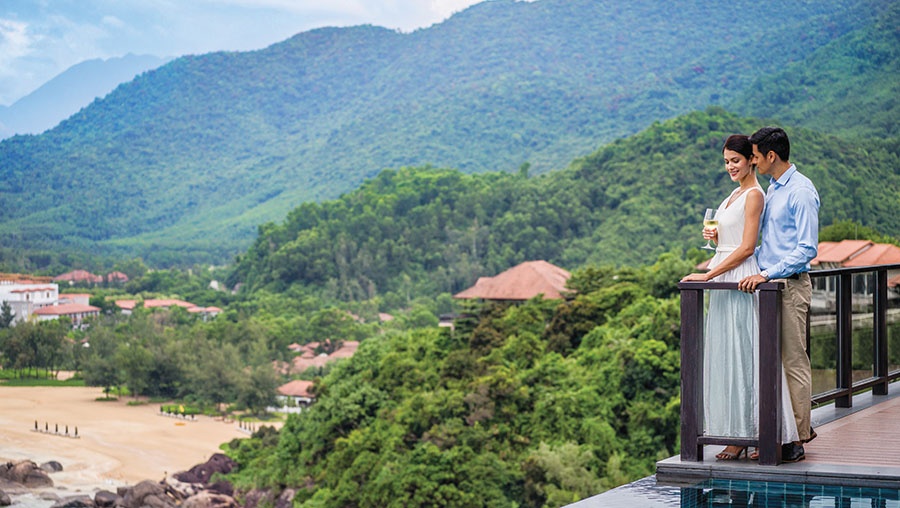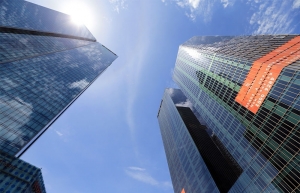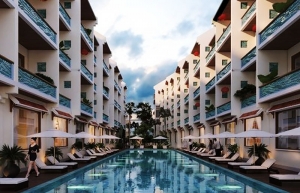Vietnam’s hospitality attracts foreign investors
The 5-star Angsana & Dhawa Ho Tram resort complex in the southern province of Ba Ria-Vung Tau, two brands under luxury hospitality operator Banyan Tree Group, officially opens its doors to guests this month.
Banyan Tree is an international hotel operator from Singapore, operating and managing over 60 hotels and resorts in 30 countries. In Vietnam, the group operates two hotel and resort complexes in Thua Thien-Hue and Ba Ria-Vung Tau provinces.
Meanwhile, investor Long Dao told VIR that his business had completed negotiations with Banyan Tree to put a new resort in Mu Cang Chai, a tourist spot in the northern province of Yen Bai, into operation. “It is expected that in early 2024, the resort in Mu Cang Chai operated and commercially exploited by Banyan Tree will begin to open to guests, marking the first presence of a luxury hotel management group in the northern mountainous region of Vietnam,” Long said.
 |
| Vietnam’s hospitality attracts foreign investors |
Strong Management
Previously, a number of other international hotel brands also increased their presence in Vietnam by taking over domestic hotels in various destinations.
In mid-April, the global hotel management group Marriott International signed agreements with Vinpearl to manage an additional seven of Vinpearl’s hotels and resorts, including three hotels in Nha Trang, Hoi An, and Danang and four new builds comprising more than 1,200 rooms that are expected to open by 2028.
Marriott International currently operates 16 hotels and resorts in Vietnam. In the coming years, the group will bring several exciting brands to the country, such as The Ritz-Carlton, Westin Hotels & Resorts, Element by Westin, and Courtyard by Marriott.
At the end of last year, Spanish hotel group Meliá Hotels International successfully took over the management of 12 Vinpearl hotels and resorts. The cooperation with Vinpearl will bring the total number of the group’s room count for Vietnam to 24 hotels and resorts. Meanwhile, South Korean Hanwha Group is cooperating with Lodgis Hospitality, the owner of Sofitel Legend Metropole Hanoi, and a major shareholder of The Grand Ho Tram Strip in Vung Tau, to develop and manage several hotel and resort projects across Asia, including Vietnam.
Lodgis Hospitality was formed through a joint venture between Warburg Pincus and VinaCapital. Currently, in total, this business owns and manages 11 hotels and resorts in Vietnam and Cambodia. The company hopes to operate 10,000 rooms by 2025.
Morgan Ulaganathan, head of asset services and hospitality advisory at property consultancy Colliers Vietnam, said resort real estate firms have made bold moves in recent times to prepare for the long-term wave of tourism recovery and development.
“Vietnam holds huge potential for developing the resort tourism with high capital deployment demand,” Ulaganathan said. “Many funds are raising capital to invest in hotel assets at a time of favourable valuation, before hotel revenue fully recovers.”
The hotel business is being evaluated as having potential for foreign investors because many owners have cash flow difficulties and are willing to transfer at a reasonable price.
According to Savills Vietnam, most of the hotels for sale belong to individual entrepreneurs, who are the first victims falling into crisis and find it hard to compete with professional international developers and operators with high-quality products.
Rapid Growth
Meanwhile, international-branded hotels such as Pullman, Novotel, and Grand Mercure still proved their attraction in the market in the second half of last year, recording 40 per cent higher average room rates and 8 per cent higher occupancy rates compared to hotels managed by the owners themselves or Vietnamese brands.
Su Ngoc Khuong, senior director of Savills Vietnam, said tourism real estate is a segment where investors were likely to find special opportunities in the Vietnamese market.
“Resort real estate is still the top investment choice of many investors, especially those from South Korea, Japan, Singapore, and Hong Kong,” Khuong said.
According to the Vietnam National Real Estate Association, the country currently has around 240 tourism property projects with a total of 114,000 condotels, and nearly 24,400 resort villas.
The recovery of key tourism markets such as China, South Korea, Japan, and Europe is also creating abundant opportunities for businesses in the tourism sector, including the hospitality industry.
According to HSBC’s May macro data analysis report, Vietnam welcomed nearly 4.6 million international arrivals in the first five months of 2023, reaching 60 per cent of the planned target of 8 million international visitors in 2023 and 12 times higher than the same period last year. So far this year, the country has catered to nearly 50.5 million domestic tourists.
“With the upcoming peak summer tourist season and the possibility of easing visa restrictions, Vietnam is likely to see a stronger hit from international tourism,” the report said.
Norbert Vas, vice president of Business Development at Archipelago International, said Vietnam’s tourism industry has a development prospect that is not inferior to major markets in Southeast Asia such as Thailand or Indonesia, especially when the middle class is growing rapidly and their travel needs are increasing.
Vas said that Archipelago chose to enter Vietnam at this time because it did not want to miss out. “We have already proposed a fascinating mid-sized project in the north, where we know that our experience in launching hill town resorts in Indonesia will be an excellent advantage for the hotel owner and ourselves,” he said.
| Steven Wolstenholme - President cum CEO Hoiana Resort & Golf
Vietnam has great nature with a coastline stretching over 3,000 km, many beautiful pristine islands, and tropical climates that can be exploited for tourism all year round. The rich, diverse culture and friendly, hospitable people are also a valuable resource. The country’s tourism still has a lot of room for development. In addition to preserving and promoting the available advantages of local tourism, foreign investors and the accompanying advantages of capital, management experience, and worldwide brands can create an ecosystem with a variety of products and services in adventure, medical, and golf tourism, for example. The country’s total tourism revenue in 2019 reached around $32.8 billion, accounting for nearly 10 per cent of GDP, but I think this is still humble compared to the potential of Vietnam’s tourism. I appreciate the environment for foreign investors in Vietnam, as well as its open, friendly, and supportive policies for foreign-invested businesses. Laurent Myter - Group general manager The Anam Group
South Korean tourists are returning, and we are fortunate to have them. Over the past two or three months, the European market has been gradually recovering too. Many airlines such as Vietnam Airlines, Qatar, and Emirates are starting to increase their flights to Vietnam, with two or so a week, and that is a good sign. I feel positive about tourism in Vietnam for the rest of this year. At The Anam Cam Ranh, we are completing AXI Plaza and would like it to be fully operational by the end of the year. We are also planning to have a wonderful project in south-central Phu Yen province, and our plan is to build two resorts, one of which will have The Anam name and the other will be an international brand. These resorts will be pool villas only, and all will have sea views. |
 | The recovery of hospitality In Asia-Pacific, international arrivals continue to grow as border restrictions ease. Most countries have opened borders and lifted quarantine requirements for vaccinated travellers. However, the reopening across the region has been segmented, achieving different results in different countries. |
 | Hospitality and real estate experts to share their views Since the end of 2022, Vietnam’s hospitality and real estate sector has experienced numerous challenges. Despite this, industry experts remain quite optimistic about the potential of the market and new opportunities ahead. |
 | New urban resort and hospitality company launched in Vietnam The Wafaifo Resort, a five-minute walk from Hoi An in central Vietnam, will be the first project for the ambitious hospitality consultancy firm. |
 | Hospitality industry looks to level up Savills Hotels, in partnership with WeHub, hosted a Meet The Experts event in Ho Chi Minh City on March 30. More than 40 speakers held lively discussions with international developers, hotel owners, and professionals while the industry's performance was reviewed and market prospects were discussed. |
 | Hospitality and real estate conference a soaring success Vietnam’s largest Hospitality and Real Estate conference Meet The Experts, organised by Savills in partnership with Dulux Professional, took place at InterContinental Saigon Hotel in Ho Chi Minh City on March 30. |
 | 2023 Vietnam Hospitality Conference kicks off Post-pandemic tourism is expected to boost the Vietnamese hospitality real estate industry despite various hurdles, according to speakers at the 2023 Vietnam Hospitality Conference. |
What the stars mean:
★ Poor ★ ★ Promising ★★★ Good ★★★★ Very good ★★★★★ Exceptional
Related Contents
Latest News
More News
- Tides of Heritage: A Tet speciality at InterContinental Phu Quoc Long Beach (January 20, 2026 | 12:08)
- Muong Thanh launches Lunar New Year gifts inspired by tradition (January 16, 2026 | 16:41)
- The Grand Ho Tram seeks responsible entertainment with pilot casino access (January 16, 2026 | 10:56)
- Ocean Resort by Fusion Quy Nhon launches Lunar New Year 2026 package (January 15, 2026 | 11:11)
- Regent Phu Quoc announces general manager appointment (January 15, 2026 | 11:06)
- Fusion to debut two landmark hotels in early 2026 (December 26, 2025 | 11:46)
- Pan Pacific Hanoi unveils festive season of light and music (December 15, 2025 | 18:22)
- JW Marriott Hotel & Suites Saigon unveils festive initiatives (December 12, 2025 | 15:12)
- Festive magic by nature unfolds at JW Marriott Cam Ranh Bay Resort & Spa (December 11, 2025 | 18:17)
- The Reverie Saigon presents festive programme (December 11, 2025 | 18:15)



 Tag:
Tag:



















 Mobile Version
Mobile Version